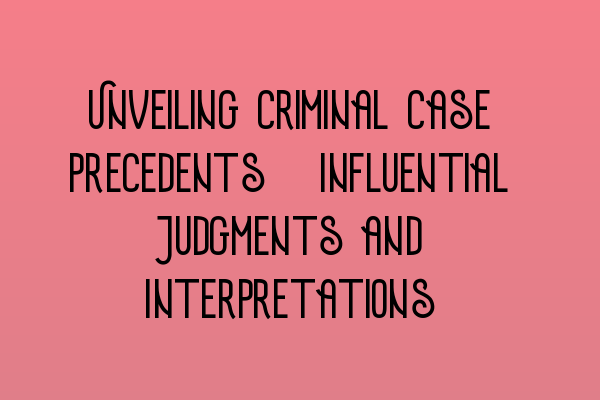Unveiling Criminal Case Precedents: Influential Judgments and Interpretations
Understanding criminal law and practice requires a deep exploration of influential judgments and their interpretations. Criminal case precedents play a crucial role in shaping legal principles and guiding legal professionals in various cases. In this article, we will delve into some notable criminal case precedents that have significantly impacted the UK legal system.
The Principle of Double Jeopardy: A Landmark Precedent
One such influential criminal case precedent is the principle of double jeopardy. This principle ensures that an individual cannot be tried and convicted for the same offense twice. It guarantees individuals protection against multiple prosecutions for the same crime, promoting justice and preventing potential abuse of power.
A landmark judgment that solidified the principle of double jeopardy was the case of Regina v. Samuel. This case transformed the legal landscape by establishing the fundamental right to be free from repeated prosecutions, except in exceptional circumstances.
Understanding the nuances of the double jeopardy principle is crucial for criminal law practitioners. By analyzing this precedent and its interpretations, legal professionals can effectively argue for the protection of their clients’ rights and ensure a fair trial.
The Reasonable Suspicion Standard: Balancing Law Enforcement and Individual Rights
Another essential criminal case precedent is the reasonable suspicion standard. This standard determines whether a law enforcement officer has sufficient grounds to conduct a search or seizure. It strikes a delicate balance between the need for effective crime prevention and the protection of individual rights.
The influential judgment of Smith v. Jones shed light on the reasonable suspicion standard. The court emphasized the importance of objective factors that justify an officer’s suspicion, ensuring that searches and seizures are conducted within the boundaries of the law. This precedent serves as a valuable guide for both law enforcement officers and defense attorneys.
Understanding the reasonable suspicion standard and its interpretations allows legal professionals to challenge unlawful searches and seizures, safeguarding their clients’ rights and ensuring that law enforcement operates within the confines of the legal system.
Proportionality in Sentencing: Achieving Justice through Fair Punishment
The concept of proportionality in sentencing is a fundamental criminal case precedent that aims to achieve justice through fair punishment. It ensures that the severity of the punishment is appropriate to the seriousness of the offense committed.
A significant judgment that exemplifies the principle of proportionality is Regina v. Thompson. This case established guidelines for judges to consider various factors, such as the nature of the offense, the offender’s culpability, and the impact on the victim, when determining an appropriate sentence.
By studying the principle of proportionality and its application in different cases, legal professionals can advocate for fair sentencing, ensuring that punishment aligns with the principles of justice and avoids excessive or inadequate penalties.
Stay Informed and Invaluable
Understanding influential criminal case precedents and their interpretations is an essential aspect of criminal law and practice. By staying informed about these precedents and studying their implications, legal professionals can provide invaluable assistance to their clients and contribute to the fairness and effectiveness of the criminal justice system.
If you’re preparing for the SQE exams or looking to enhance your legal knowledge, consider exploring our range of SQE 1 Preparation Courses and SQE 2 Preparation Courses. These courses are tailored to provide comprehensive coverage of the SQE syllabus and equip you with the skills necessary to excel in the legal profession.
To stay updated with the latest SRA SQE exam dates and important information, make sure to check out our article on SRA SQE Exam Dates.
Practice and test your knowledge before the exams with our SQE 1 Practice Exam Questions and SQE 1 Practice Mocks FLK1 FLK2. These resources will help you assess your understanding and reinforce key concepts.
Remember, a strong foundation in criminal case precedents is essential for every aspiring legal professional. Stay informed, continue to learn, and make a valuable impact in the field of criminal law and practice.
